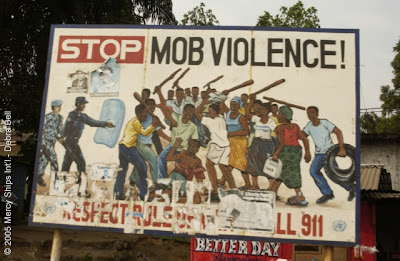
Six thousand miles away from the United States lies a country whose flag bears a striking resemblance to the American one…alternating red and white stars, and in the upper left hand a blue box. Against this background is one lone white star…the star of liberty. Settled in the early 1800s by freeborn Blacks and former slaves of America, Liberia considers herself the 51st state, displaying the close ties she holds with the US. She is the known for her diamonds, iron ore, timber, gold and rubber (6th largest in the world, and largest in Africa). Her people are known for their hospitality.
The Americo-Liberians settled and founded Christopolis as the capital, meaning “city of Christ”. (This was later changed to Monrovia, after President James Monroe pardoned a large debt.) Liberia’s Declaration of Independence was signed on July 26, 1847, in a small church named Providence Baptist. Liberia’s national motto since then has been, “The love of liberty brought us here-“.
President Joseph Roberts, a wealthy merchant trader from Virginia, was the first president of Liberia and served as such from 1848 to 1856. Although this was to be the land of liberty, over time there proved to be tension between these elite Americo-Liberians and the indigenous Liberians. Overtime… tension began to swell.
Liberia, as the only free republic in Africa, was a model for African colonies struggling to achieve independence. The election of President William Tubman in 1944 brought much conflict and tension within Liberia’s borders. Although he helped to modernize Liberia, the gap between the ruling elite and the indigenous populations increased. By the time of his death in 1971, frustrations in Liberia were running high. His successor, William Tolbert attempted to improve the economic and political climate but his efforts backfired and sparked violent demonstrations.
Although some soldiers sympathized with the demonstrators, others strongly held to the power of the military. In 1980, a group of enlisted men led by Samuel Doe, a 28 year old indigenous master sergeant fought their way to the presidential mansion and executed Tolbert. Thirteen other members of the Cabinet were also publicly executed. Many fled, others imprisoned. Doe was inexperienced and not prepared to rule. He began to favor people of his own ethnic background, and support began to dwindle. In 1985, Doe declared himself the winner of a presidential election he had actually lost. His corrupt government became more repressive of the people and violence began to spring up between indigenous populations who had coexisted peacefully before.

The brutal treatment many had received by the hand of the government forced the indigenous northerners across the border to the Ivory Coast. There, a man named Charles Taylor organized and trained many of them. When Taylor and his 100 rebels reentered Liberia in 1989 on Christmas Eve, thousands of Gio and Mano joined them. A brutal civil war arose. In September 1990, Doe was captured and tortured to death by another rebel group originally associated with Taylor and civil war resulted, full force. Entire villages were emptied as people fled. Soldiers, many of them children, committed unspeakable war crimes, raping and murdering people of all ages, in what became one of the world’s worst episodes of ethnic cleansing.

Five years later, Charles Taylor agreed to a cease-fire and a timetable to demobilize and disarm his troops. He then won the 1997 presidential election because Liberians hoped that he would end the bloodshed. Although it did slow, it did not end. Taylor was accused of backing guerrillas in neighboring countries and putting money from diamonds into firearms used for the rebel armies that he supported.

A new civil war began in 1999 with new rebel groups gaining control. By 2003, Taylor’s government only controlled a third of the country. Conflict continued. After action was taken by the UN and US, President Taylor resigned in August 2003 as part of a peace agreement and was flown into exile in Nigeria. Elections in 2005 marked the end of the political transition that occurred after the civil war. Ellen Johnson-Sirleaf, former World Bank employee and finance minister, Harvard grad, won the presidential election and became the first female president in all of Africa.

Today, the war fatigue in Liberia is beginning to lift. People are beginning to rebuild their lives, but the road is long. For the fourteen years of civil war, education stopped in Liberia. A generation of children have lost siblings and family members. They know how to hold a machine gun, but do not know how to spell their name. Below are some of the stats today. I believe that these are pretty generous. The UN is not able to rate the degree of poverty in Liberia compared to other countries because of how destroyed it is from the war. It does not even make the list.

*80% unemployment
* 75% live below the poverty line of less than $1 per day
*1 out of 6 people dependent on international food aid
*Major hydroplant destroyed. No electricity or running water.
*10% have access to healthcare
*25% have access to safe drinking water
*50% of children get Malaria during the wet season
*1 million internally displaced people (IDPs) ~ countless becoming orphans b/c parents murdered or placed in orphanges until parents can be found
*Years of corrupt government leaves the UN to find trustworthy civilians to rebuild a competent Liberian police force before pulling out.


No comments:
Post a Comment